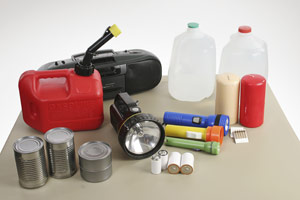Emergency Preparedness on the Job
|
 |
 Events over the past decade have reinforced the importance of emergency preparedness--from the devastation of Hurricane Katrina in New Orleans to the meltdown of the Fukushima nuclear power plant. We have seen how large scale disasters have the power to overwhelm local, state and even federal response capacity.
Events over the past decade have reinforced the importance of emergency preparedness--from the devastation of Hurricane Katrina in New Orleans to the meltdown of the Fukushima nuclear power plant. We have seen how large scale disasters have the power to overwhelm local, state and even federal response capacity.
The list of events the CDC and Homeland Security encourage businesses to prepare for include natural disasters, mass casualties, radiation emergencies, biological and chemical threats and terrorist attacks. Have you ever thought about how one of these events could affect your business?
To ensure that your business is prepared for a widespread disruption, consider the following recommendations.
Create a task force
This task force might include personnel from human resources, the executive ranks, finance and operations, and should perform the following:
- Develop a comprehensive plan for conducting business with multiple scenarios that addresses operations ranging from a reduced staff presence to no staff being able report for work.
- Create multiple communication channels so that the task force can stay in contact.
- Identify a central location (physical and then virtual) to assemble and review all pertinent documents and data needed to make informed decisions moving forward.
- Clarify lines of authority and communication protocols.
- Develop or review company delegations of authority for emergency operations. Be clear about decision-making authority and how decisions will be relayed/announced--especially if there is an extended period of disruption.
- Develop or review orders of succession for emergency operations.
Develop a plan
The first three questions the task force should ask are:
- How vulnerable would our business be if a disaster or other emergency were to occur?
You should know your region and the types of disasters most likely to have an impact on your business. Consider your facility's physical capacity to resist damage and proximity to flood plains, seismic faults, dams, hazardous materials, nuclear power plants and other hazards.
- What is our plan to protect the business and its employees before, during and after an emergency? Are 10-15 percent of your employees trained in basic first aid and CPR techniques? Can all of your employees identify individuals who are trained? Who will you contact in an emergency, and what will they be able to provide? Do you own the necessary safety equipment, such as first aid kits, Automatic External Defibrillators (AEDs), fire extinguishers, smoke detectors and shelter-in-place supplies?
- Do you have a Continuity of Operations Plan (COOP)? This plan will help keep your business operating as it responds and recovers from the effects of a disaster or emergency situation. To develop a COOP:
- Identify essential business functions and staff to carry out these functions.
- Establish procedures with suppliers, vendors and other businesses critical to daily operations.
- Create a plan for conducting business if the facility is not accessible and set up electronic back-up systems for vital business files.
- Identify records and documents that must be readily accessible to perform essential functions and decide where these can be stored safely and retrieved quickly.
- Identify essential business functions and staff to carry out these functions.
When writing your plan, assess the impact a major disruption would have on staff, clients, suppliers, contractors, vendors, service providers and other dependencies up and down the line.
Attention should be given to:
- school closure implications
- transportation complications
- building access
- security issues
- staffing needs
- transportation implications for providing or receiving goods and services
- procurement
- banking (including payroll, check processing and cash needs)
- telecommunications demand (ability to work from home, connecting to office IT systems, etc.)
Also consider:
- Developing a best-case/worst-case scenario plan.
- Reviewing contracts (ones requiring you to perform certain responsibilities and ones where you require others to perform to certain expectations).
- Assessing financial implications for your business including: cash flow, inventory, bills, receivables, budgets, contracts and upcoming major activities or events that carry financial obligations.
Update communication policies and procedure
- Be sure that everyone understands how to get information from management if that becomes necessary. Update phone and email contact information.
- Review policies and procedures associated with alternative working conditions or telecommuting. Confirm that everyone has the current information necessary to work from home and access central systems.
- Consider creation of a regular company-wide voicemail and/or email update. Pre-arrange with a conference call company to establish a call-in number and service for company updates and assignments.
- Address the risks for fraudulent communications, and have a plan for ready response and corrections with accurate information.
- Reach out now to staff, suppliers, customers and other key people to inform them of your contingency plans and appropriate contact information. Determine how to best reach customers with updates on company operations.
Developing an emergency preparedness plan is one of the most important strategic decisions you will make as a business owner. Consider how a natural, human-caused or public health disaster could affect your employees, customers and workplace, and you will realize that a preparedness program is a valuable investment.